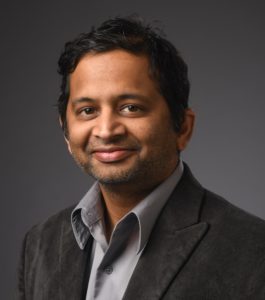Keynote talk #1
Title: 5G RAN Virtualization – Challenges and Opportunities
Speaker: Sridhar Rajagopal
Organization: Mavenir Systems
Bio:
Sridhar Rajagopal is a Vice President at Mavenir Systems, where he heads the system design for Mavenir’s virtualized cloud RAN products for LTE and 5G. Prior to this, he was VP, system engineering as one of the initial employees at Ranzure Networks, a cloud RAN start-up. He also had R&D roles in design, prototyping and standardization of 5G cellular and Wi-Fi systems at Samsung, in UWB technology at WiQuest communications and 3G/4G research at Nokia. He was an associate editor for the Journal of Signal Processing Systems (Springer) and has held leadership positions in standardization bodies such as IEEE and WiMedia. He was a co-recipient of the IEEE 2017 Marconi Prize Paper award for his research on mmWave systems. He has co-invented around 43 issued US patents. He received his M.S. and Ph.D. degrees from Rice University and is a senior member of IEEE.
Abstract:
5G RAN virtualization refers to the ability to run the 5G protocol stack largely in software in a cloud native platform. With more powerful processors coming every generation and cloud-based data centers, virtualization enables operators to reduce CAPEX and OPEX by eliminating proprietary hardware, resource pooling across sites and enabling solutions to be upgraded and operated in a centralized and scalable manner. While hypervisors are more mature , the growing trend in virtualization is moving towards a container-based cloud native platform, which enables smaller footprints and better support for real-time requirements. The 3GPP and Open RAN standards have evolved to allow functional splits of the RAN that enable most of the RAN to be virtualized while keeping on the radio and a small portion of the physical layer processing to remain on the site. This talk provides insights into the evolution of RAN virtualization for 5G and the challenges that need to be solved to enable widespread adoption and deployment of virtualized RAN networks in a scalable, cost efficient manner.
Keynote talk #2
Title: Network Verification: Past, Present, and Future
Speaker: Nate Foster
Organization: Cornell University & Barefoot Networks
Bio:

Nate Foster is an Associate Professor of Computer Science at Cornell University and a Principal Research Engineer at Barefoot Networks. The goal of his research is to develop tools that make it easy for programmers to build secure and reliable systems. His current work focuses on the design and implementation of languages for programming software-defined networks. He received a PhD in Computer Science from the University of Pennsylvania, an MPhil in History and Philosophy of Science from Cambridge University, and a BA in Computer Science from Williams College. His honors include a Sloan Research Fellowship, an NSF CAREER Award, the ACM SIGCOMM Rising Star Award, and several best paper and teaching awards.
Abstract:
Networks today achieve robustness not by adhering to precise formal specifications but by building implementations that tolerate modest deviations from correct behavior. This philosophy can be seen in the slogan used by the Internet Engineering Task Force, “we believe in rough consensus and running code,” and by Jon Postel’s famous dictum to “be conservative in what you do, be liberal in what you accept from others.” But as networks have grown in scale and complexity, the frequency of faults has led to new interest in techniques for formally verifying network behavior. This talk will discuss recent progress on practical tools for specifying and verifying formal properties of networks. In the first part of the talk, I will present p4v, a tool for verifying the low-level code that executes on individual devices such as routers and firewalls. In the second part of the talk, I will present NetKAT, a formal system for specifying and verifying network-wide behavior. In the third part of the talk, I will highlight some challenges and opportunities for future research in network verification.
Keynote talk #3
Title: Is Optics Catching up with SDN?
Speaker: Andrea Fumagalli
Organization: The University of Texas at Dallas
Bio:

Andrea Fumagalli is a Professor at the Department of Electrical and Computer Engineering of the University of Texas at Dallas. He holds a Ph.D. in Electrical Engineering from the Politecnico di Torino. From 1992 to 1998 he was an Assistant Professor at the Electronics Engineering Department of Politecnico di Torino. He served as Program Head of the Telecommunications Engineering program at UT-Dallas from 2007 to 2012.
Dr. Fumagalli’s research interests include aspects of mobile and optical networks, related protocol design and performance evaluation. He has published more than two hundred papers in refereed journals and conferences. Dr. Fumagalli has made multiple earlier contributions to the area of high speed and optical network architectures, including protocol design, performance evaluation, and packet switching. He has been involved in a number of research projects focusing on packet switched optical networks sponsored by NSF and ARPA, and collaborated with leading network equipment suppliers and operators.
Abstract:
Optical technologies can provide the transmission capacity needed to support new applications that are increasingly becoming bandwidth greedy. If properly leveraged these technologies can provide more than just a static point-to-point high data rate transmission link between switches or routers. Reconfigurable Optical Add Drop Multiplexers or ROADMs can be deployed to offer applications the ability to dynamically configure and take full advantage of the available optical network transmission resources. This talk will describe three Software Defined Networking (SDN) solutions applied to ROADM-based optical networks and show how they are experimentally tested at and around the University of Texas at Dallas campus.
Keynote talk #4
Title: Network Function Virtualization Modeling and Service Function Chaining
Speaker: Ying Zhang
Organization: Facebook
Bio:

Ying Zhang is Software Engineering Manager in Facebook. She works on large scale network management problems and her research interests are in Software-Defined Networks, Network Function Virtualization, network monitoring, Internet routing, and network security. She has 30+ granted US/International patents, 50 peer-reviewed publications with about 1500 citations, and she was named by Swedish media as Mobile Network 10 Brightest Researcher. She was awarded as a Rising Star in the Networking and Communications area.
Abstract:
The ability to deploy Service Function Chains (SFC) efficiently and correctly is important in Network Functions Virtualization (NFV) infrastructures. This talk discusses the challenges and proposed solutions for scalable instantiation and verification of SFCs, from modeling to its application in verification.



